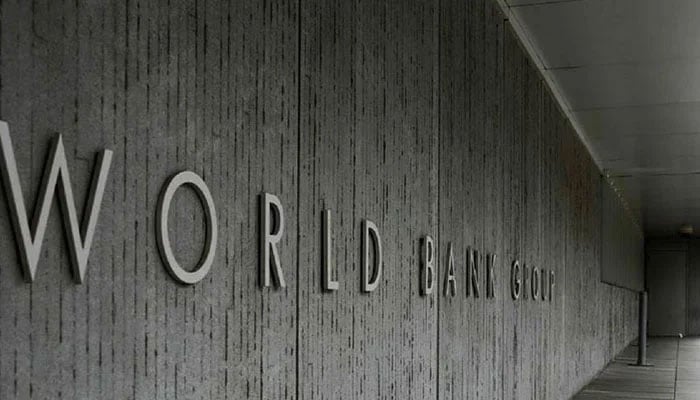WB revises Pakistan GDP forecast down to 1.8pc
WB has asked to introduce immediate parametric reforms to reduce the fiscal liability arising from federal and provincial public sector pensions
ISLAMABAD: With continuous recommendations for hiking electricity and gas tariffs, the World Bank (WB) has revised downward the GDP growth projection to 1.8 percent and kept inflation at 26 percent for the current fiscal year. This has led to poverty level stagnant at 40 percent population living below the poverty line in Pakistan.
On pension reforms, the WB has asked to introduce immediate parametric reforms to reduce the fiscal liability arising from federal and provincial public sector pensions. It asked to develop and take initial steps to implement a longer-term pension reform plan to ensure fiscal affordability over the long-term. It also sought initial steps under a reform plan to rationalise public sector compensation, including through simplification and monetisation of benefits.
This was stated in Pakistan Development Update: Fiscal Impact of Federal State-Owned Enterprises released by the World Bank on Tuesday.
The official projection of GDP growth is estimated at 3.5 percent, while inflation hovering around 21 to 22 percent on average for the current fiscal year. The WB has projected the inflation will start receding from coming fiscal year around 15 percent in FY2025 and 11.5 percent in FY26. The WB has projected the fiscal deficit to climb to 8 percent of GDP, highest in the absolute figures.
The WB asked to continue electricity and gas sector tariff reform to align tariffs with the cost of supply to constrain mounting gas and electricity sector circular debt and protect the poor through enhanced social protection.
On revenue reforms of Personal Income Tax (PIT), the WB asked for bringing reform in the PIT system to reduce complexity by aligning schemes for salaried and non-salaried workers. It asked to reform Personal Income Tax schedules to increase equity by eliminating privileged treatment of specific income sources and by harmonising rate structures across taxable income sources.
The WB suggested increasing taxes on socially harmful goods, including increased taxation of tobacco, other unhealthy products and environmentally damaging goods. It asked for eliminating Personal Income Tax “withholding” charges on consumption of energy products, telecommunications, financial services, and others to reduce the total tax burden among poor and vulnerable household.
The WB asked for revenue mobilisation from under-utilised resources as for Urban Immovable Property Tax (UIPT), to apply harmonised valuation tables (currently rental-value based) to be updated annually based on observed variables such as inflation, insurance valuation, sales records, to equalise rates between owner occupiers and rentals.
For agricultural income tax, it asked to make consistent the definition of land area and reconsider exemptions based on the size of land holdings; set common minimum rates based on crop acreage or production estimates; incorporate irrigation and/or constructed buildings to differentiate per hectare minimum rates.
For capital Gains Tax, unify treatment of builders, property developers, REITs and others; simplify the types of taxes-related to capital gains and transfers (CGT, CVT, stamp duty, withholding); remove years-held based differential rates and simplify the rate structure.
To align federal and provincial governments’ expenditures, the WB asked to implement the new Fiscal Responsibility and Debt Limitation Acts at the federal and provincial levels, including through development and implementation of a national medium-term fiscal framework through the FY25 budget process.
The WB asked to fully implement the Treasury Single Account (TSA) to reduce the government’s cash holdings, reducing interest costs (estimated Rs424 billion savings annually). It asked to reduce subsidy expenditure, including tube-well, gas, wheat and fertilizer subsidies (estimated Rs300+billion savings annually). It is critical to shield against any negative impacts on the poor through enhanced social protection.
It said Pakistan’s economy is expected to grow by only 1.8 percent in the current fiscal year ending June 2024.
-
 Courtney Love Makes First Appearance Since New Report On Kurt Cobain's Death
Courtney Love Makes First Appearance Since New Report On Kurt Cobain's Death -
 King Charles Anxious As Uncertainty Grows Over Sarah Ferguson’s Next Move
King Charles Anxious As Uncertainty Grows Over Sarah Ferguson’s Next Move -
 Real Reason Kim Kardashian Is Dating Lewis Hamilton
Real Reason Kim Kardashian Is Dating Lewis Hamilton -
 Rihanna Leaves Elderly Woman Star-struck In Viral Grocery Store Video
Rihanna Leaves Elderly Woman Star-struck In Viral Grocery Store Video -
 TikTok US Launches Local Feed Using Precise Location Data
TikTok US Launches Local Feed Using Precise Location Data -
 Jill Biden’s Former Husband Charged With Wife’s Murder
Jill Biden’s Former Husband Charged With Wife’s Murder -
 Zayn Malik Reveals Parenting Decision Gigi Hadid Criticized Him Over
Zayn Malik Reveals Parenting Decision Gigi Hadid Criticized Him Over -
 Palace Releases Prince William's Photos From Final Day Of His Saudi Arabia Visit
Palace Releases Prince William's Photos From Final Day Of His Saudi Arabia Visit -
 Microsoft Warns Of AI Double Agents As Enterprise Adoption Of AI Agents Surges
Microsoft Warns Of AI Double Agents As Enterprise Adoption Of AI Agents Surges -
 Kate Middleton, Prince William Break Silence Over Tragic Shooting In Canada
Kate Middleton, Prince William Break Silence Over Tragic Shooting In Canada -
 'Finding Her Edge' Star Madelyn Keys Explains Adriana's Remarks About Brayden Romance
'Finding Her Edge' Star Madelyn Keys Explains Adriana's Remarks About Brayden Romance -
 Royal Expert Raises Questions Over Sarah Ferguson's 'plotting' Stunning Comeback
Royal Expert Raises Questions Over Sarah Ferguson's 'plotting' Stunning Comeback -
 Instagram Develops AI ‘Create My Likeness’ Tool To Generate Personalised Photos And Videos
Instagram Develops AI ‘Create My Likeness’ Tool To Generate Personalised Photos And Videos -
 Meghan Markle, Prince Harry Friends Suggest Their Marriage 'isn't All It Seems'
Meghan Markle, Prince Harry Friends Suggest Their Marriage 'isn't All It Seems' -
 Andrew Handed Out 'classified' Information To Jeffrey Epstein
Andrew Handed Out 'classified' Information To Jeffrey Epstein -
 Margot Robbie Recalls Wild Party Days And Getting Kicked Out Of Clubs
Margot Robbie Recalls Wild Party Days And Getting Kicked Out Of Clubs




